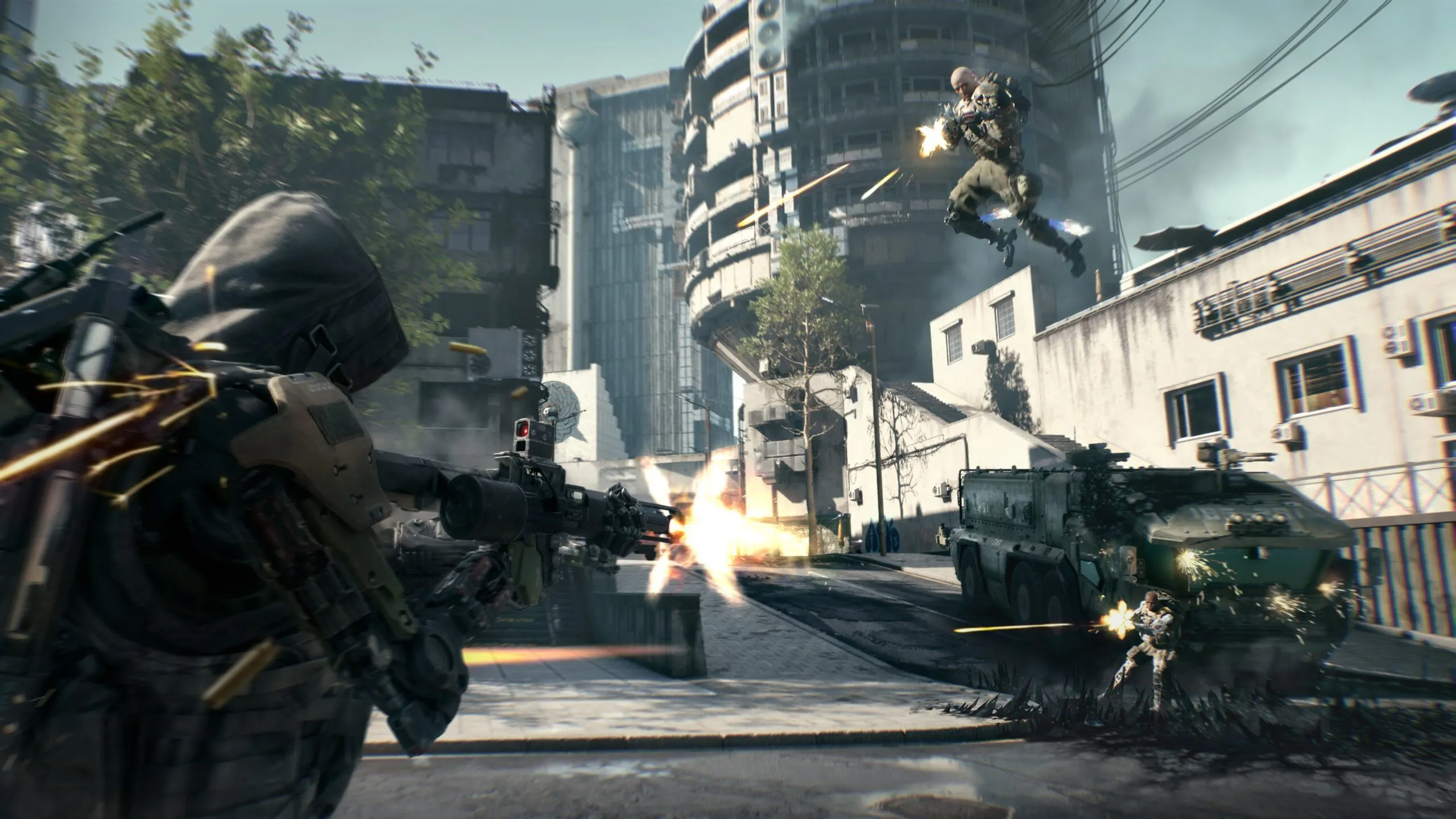Avalanche-based battle royale shooter Off the Grid has experienced mainstream success that we haven’t seen from crypto games before. The third-person shooter quickly became the top free-to-play title on the Epic Games Store last month, as the early access rollout attracted a crowd of traditional gamers—some of whom may be more open to Web3 than before.
But what made the big launch a crypto gaming success, and how could Off the Grid’s unique approach impact how future blockchain games attempt to reach players?
Most industry experts that Decrypt spoke with put Off the Grid's success down to the “game-first” approach that a section of crypto builders have been hailing for some time. That's when a title focuses on providing quality gameplay above all, rather than leading with crypto and NFT elements and expecting those features—and the associated financialization—to draw players in.
“It validates our ‘game-first’ approach,” Hans Andersson, CBO and co-founder of Moonray Studios, the creators of Ethereum combat arena game Moonray, told Decrypt. “To achieve broad adoption, you need to focus on the gamer and what brings value to them. The gaming experience must be in the center.”
Off the Grid’s gameplay was the primary focus during its early access launch, with tons of clips going viral on social media showcasing the battle royale game’s unique mechanics compared to genre heavyweights like Fortnite, Apex Legends, and Call of Duty: Warzone.
In fact, it took some time for players to even realize that it was a Web3 game at all. While some gamers were offended by the idea of crypto being used in a video game, others—including former professional Counter-Strike player Michael “Shroud” Grzesiek—said that they were coming around to the idea of an NFT item marketplace.
Top streamer @shroud points out how obvious crypto gaming is live on stream.
First of many dominos🔺
pic.twitter.com/gS7srvdFPT— Avery9000 (@avedarave_) October 13, 2024
“We appreciate that they’ve been able to show you can deliver a strong game and rise above the noise,” Robert Bowling, studio head of Midnight Society, the creator of extraction shooter Deadrop, told Decrypt. “We love seeing them successfully attract the top players and champion a game-first mentality.”
While that approach might appear obvious, it arrived in contrast to what crypto gaming has historically been known for. Film producer Marco Weber, who is a co-founder of sci-fi IP Space Nation—which includes an Ethereum game—recently told Decrypt that when he first entered the crypto gaming industry, he was alarmed at how much “crap” there was out there.
For example, Pixelmon raised $70 million in 2022 by selling NFTs, promising to deliver a Pokémon-style game that could improve upon the classic Nintendo formula with the benefits of blockchain.
But when the NFT artwork was revealed soon after to widespread backlash, the game’s founder admitted that it was all a “horrible mistake,” and it became a punchline for the industry. After that miserable start, Pixelmon was acquired by another firm and completely reworked—with fresh artwork—to put a fresh foot forward and overcome the initial embarrassment.
So @Pixelmon raised over $70m at 3 ETH per mint just for them to reveal like this. I think it’s fair to say all the buyers were rugged.
Stop supporting cash grab NFT projects. pic.twitter.com/8VShQxNlgl
— ZachXBT (@zachxbt) February 26, 2022
Part of the crypto gaming mentality up until this point has been to “build in the open,” allowing for a game’s community to provide insight and help shape the game that is being built.
While that matches the crypto industry’s decentralized ethos, it’s an imperfect fit for game development. This has, in part, been to blame for some of the bad attention the industry has attracted, as games raise millions of dollars just to launch an incomplete product—or never launch at all.
“Thousands of Web3 games have been announced, and few teams are really able to deliver,” said Nicolas Pouard, Vice President of Ubisoft’s Strategic Innovation Lab and Head of Blockchain Initiative. Ubisoft, the firm behind Assassin’s Creed and other major game brands, is the biggest publisher playing in the crypto space.
Granted, incomplete and buggy game launches aren’t exclusive to the crypto world. Cyberpunk 2077 is a prime example of a huge, “AAA” game that launched in a terrible state, attracting awful reviews and even being pulled from some marketplaces. It took years of additional development for developer CD Projekt Red to live up to the game’s promised vision.
Instead of launching a super-early build, Off the Grid operated in a closed testing phase under strict NDA until it was deemed ready for public scrutiny. Even so, the version launched took criticism for poor optimization on PC, as well as some less-refined gameplay elements. But the “early access” tag provides some leeway for rough edges.
Pouard, an executive at one of the biggest and most successful game publishers in the world, knows well just how hard it is to launch a game—let alone a good one.
“It's very, very difficult, very hard work to build a game and to be able to finish it, polish it, and deliver it to the players in the right way.” Ubisoft’s Pouard told Decrypt. “Web3 is adding something even more difficult, because it's adding uncertainty. It's adding polarized opinion around it.”
This may be why Gunzilla Games, the developer of Off the Grid, opted not to shine a spotlight on crypto elements in the initial version of the game.
While the testnet of Gunzilla’s Avalanche-based GUNZ network is running behind the scenes, the future crypto token and NFT item elements aren’t in play. Instead of being distracted by the polarizing nature of crypto gaming, players focused on its engaging gameplay.
“The quality of the game and core gameplay loops are absolutely essential, and should drive every development decision,” said Rebecca Liao, CEO and co-founder of blockchain network Saga. “The Web3 gaming industry has burned through multiple hype cycles launching games that were essentially token distribution mechanisms with thin gameplay veneers.”
In contrast, Telegram tap-to-earn games attracted hundreds of millions of players this year. However, skeptics have criticized the genre’s simplistic clicker gameplay incentivized by dangling a future token airdrop in front of players. None of those games have managed to keep sizable audiences after handing out tokens, because there’s just not much to them otherwise.
Despite the critics, this wave of crypto gaming has undoubtedly brought in a huge audience into the world of Web3 due to the low barrier for entry—a mobile phone and the Telegram app.
Another potential way to attract such a big crowd is by getting your title onto the major console systems, as well as the biggest PC gaming platform, Steam. Off the Grid is on PlayStation 5 and Xbox Series X, but the crypto features aren’t yet baked in. And Steam has rigid anti-crypto restrictions that developers have had to sometimes compromise to get around.
“The majority of gamers are found on platforms such as PlayStation, Xbox, and Steam,” Moonray’s Andersson added, “How any of these platforms will incorporate crypto will have a tremendous impact on how blockchain games will be able to reach broad adoption.”
As mentioned, Off the Grid doesn’t currently have crypto or NFT functionality, and the makers of Moonray recently confirmed that their upcoming PlayStation 5 release will not have its usual crypto features at launch. This is a major hurdle for the industry that has yet to be tackled.
Substantial challenges remain in place before crypto games can truly reach the masses, but even in its early access state, Off the Grid already feels like a step change for the industry. There’s still plenty of work to be done, but the battle royale shooter’s viral success and game-first tact could bode well for what comes next from the industry.
“Poor execution can and will damage confidence," Liao told Decrypt, "but thoughtful integration that actually improves the player experience will help bridge the gap between Web2 and Web3 gaming and demystify some misunderstood blockchain game elements."
Edited by Andrew Hayward





